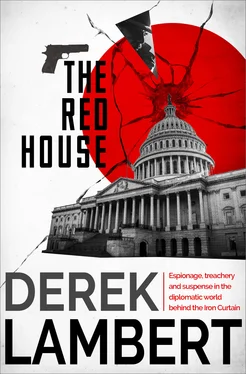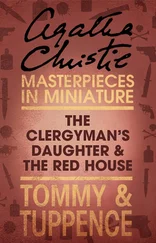‘So that is all that has impressed you about Washington—the houses?’
‘I have, of course, been struck by the standard of living.’
‘Of course you have,’ Zuvorin murmured. He offered Zhukov a cigarette. Sometimes he was surprised that more of his staff didn’t defect, because he knew perfectly well that many of them contemplated it when they first tasted the milk and honey. But they were deterred by family hostages ‘held’ in Russia, by language difficulties, by the knowledge that after the headline glamour of defection they would be misfits. Also loyalty was encouraged by promises of promotion to other Western fleshpots; and when they visited the Soviet Union they were big men, regarded with as much awe as football players or movie stars. But, the ambassador sensed, Zhukov’s temptations would be different: he would taste and savour freedom of expression. And he spoke excellent English. A man to watch; but, of course, he was already being watched as, perhaps, was Valentin Zuvorin himself.
‘I have formed the impression,’ Zhukov continued, ‘that they are a nation bent on suicide. Too much food, too much smoking, too much alcohol, no exercise. And,’ he added, ‘I have been very impressed by the fact that they never walk anywhere. Then they wonder why so many die from heart attacks.’
Zuvorin massaged his chest with two fingers and stubbed out his cigarette. Officially he was supposed to suffer from asthma. He managed a deep melodious laugh. ‘You are an original man, Comrade Zhukov. A dangerous thing to be a few years ago. But now many things have changed. Your originality—and your excellent English—has been recognized. You are to be promoted. Although you will have to wait some time before you officially become a first secretary.’
Zhukov expressed surprise. ‘I am honoured. But I have only been here three weeks …’
‘You have been fortunate,’ the ambassador said. He stood up and paced the gracious room. ‘A first secretary called Tardovsky has been recalled to Moscow at very short notice. A question of health …’ He glanced at Zhukov to see whether he had heard rumours; Zhukov remained impassive. ‘Tardovsky spoke excellent English also. You seem to be the man to take his place.’
The ambassador wondered whether to confide in Zhukov. Such a confidence might be interpreted as weakness in himself; perhaps even Zhukov himself was a senior member of the K.G.B.—second secretary at forty-four did not seem to be much of an achievement for such an intelligent man. You could never tell; nor could you equate seniority in the K.G.B. with diplomatic seniority. Although Valentin Zuvorin was fairly sure of his authority.
To hell with such furtive considerations: he, Valentin Zuvorin, occupied the most important post in the Soviet overseas diplomatic service. He sat down again near the piano. ‘Tardovsky,’ he said, ‘was on the point of persuading a neurotic American from the State Department to hand over secret documents about American intent in Vietnam and the Middle East. The Americans thought Tardovsky might defect—he had no such intention, of course. Anyway the C.I.A. and F.B.I. got wind of it. There was a squalid scene in a bar on 14th Street’—no need to elaborate—‘with the result that Tardovsky has lost all credibility and therefore all usefulness to us in Washington either as an agent or a diplomat. So he has been recalled through no fault of his own.’ Although, Zuvorin thought, his future has not been enhanced.
‘I see.’ Zhukov pondered the fortuitous factors of success.
‘Is that all you have to say, comrade?’
‘I am deeply honoured, of course. But …’
‘But what?’
‘Does this mean that I will have to carry out similar subversive duties?’
Zuvorin almost patted him on the head. ‘Don’t worry yourself about such matters. It is sufficient that you have been chosen to fill an important diplomatic post. That is all that matters for the moment.’
For who am I, the ambassador asked himself, to say whether or not you are to become a spy?
Zhukov found that his new office duties were really an extension of his old ones. Only now the emphasis was more political. He still translated American newspapers, magazines, government reports, but his reading was more selective and he was expected to be more interpretive—hooking nuances of meaning lost in flat translation. He was also asked to translate government directives that somehow reached the Embassy before publication, and some that were never published at all. These were given to him by Mikhail Brodsky, and Zhukov only typed two copies of his translation, one for the ambassador, one for Brodsky. More deference from the rest of the staff, an office of his own, the satisfaction of responsibility: these were the perquisites of the new job, and they were balanced by the demands for industry and punctuality of Ambassador Zuvorin who answered similar demands from Moscow.
Most of the day Zhukov sat at his desk in his high-ceilinged Pullman office where perhaps once a nanny had put the children of rich parents to bed. He drank gallons of tea made with lemon and Narzan mineral water imported from Russia. At night he took his work home and slept with dreams dominated by United States policies, and sometimes in his waking moments wondered what other duties might lie ahead.
One Saturday shortly after his promotion Vladimir Zhukov, on the advice of several well-wishers from within the Embassy, took Valentina for a drive into the ghetto. Time, they said, to see the other side of the coin.
First he buzzed over the Potomac, a humble bug among all the limousine dragonflies, to take a look at the Pentagon. From the parking lot he gazed at one of the five sides of the complex, built in classic penitentiary style, with qualified admiration.
‘There you are,’ he said to Valentina, ‘the United States Department of Defence. Or War,’ he added.
Unsolicited statistics lit up in his brain like figures on a computer. ‘The world’s second largest building,’ he recited. ‘Did you know that they take 190,000 phone calls a day in there? And that they have 4,200 clocks and 685 water fountains?’
‘Really?’ The sarcasm was gentle. ‘And how many cups of coffee do they drink a day?’
‘Thirty thousand,’ Zhukov said promptly, grinning apologetically.
‘It’s strange to think they could be speaking to the Kremlin right now.’
Zhukov looked at his watch. 3 p.m. ‘They probably are. Every hour on the hour they test the teletype machines. The messages are very reassuring. I read, for instance, that one test message from the Americans on the hot line was a four-stanza poem by Robert Frost—“Desert Places”.’
‘And what did the Kremlin reply with?’
‘Excerpts in Russian from a Chekhov short story about birch trees. I understand twenty messages passed between Washington and Moscow during the Arab-Israeli war. They probably averted a world war on those teletypes.’
‘Who sent the first message?’
He patted her knee. ‘Premier Kosygin.’ He was pleased about that, too. ‘And the President keeps the messages in a green leather album as a memento.’ Statistics and trivia for ever accumulating in the filing cabinet of his brain; substitutes for the sonnets he once planned to deposit there.
He pointed the Volkswagen towards the ghetto. Losing himself a couple of times in the graceful geometry, driving along 15th in which a flourishing bookshop was separated from the White House by the protective bulk of the Treasury Department; finding 14th and following its route, its lament, to the Negro quarter.
In the Saturday afternoon quiet it was an abandoned place. A discarded screen set, a pool scummy with neglect. Tenements leaning, small shop windows rheumy. A few blacks strolling to nowhere; not a white face in sight.
Читать дальше












